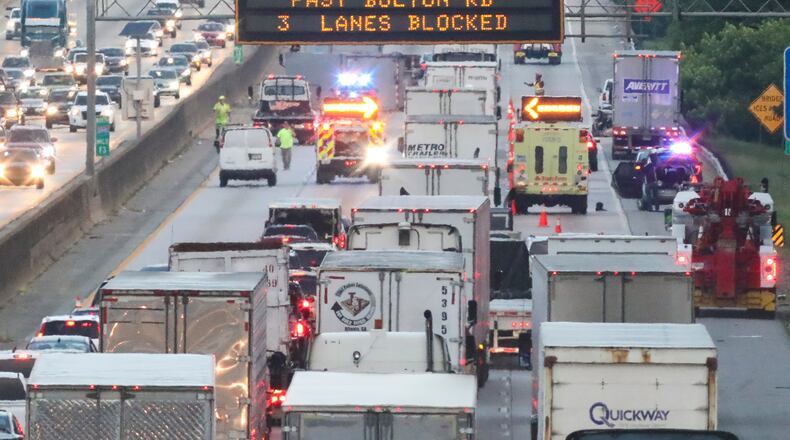A legislative panel hopes to solve a shortage of truck parking that hinders the freight industry and makes traffic worse across metro Atlanta.
Tens of thousands of trucks cruise the region’s highways each day. But three years ago, a survey found parking for trucks is hard to come by. Now the Georgia Freight and Logistics Commission hopes to address the shortage as part of a larger plan to keep freight moving across the state.
“We will come up with a plan that we can execute and fund,” Sen. Brandon Beach, R-Alpharetta, said at a meeting of the commission Tuesday.
Beach co-chairs the commission, which last January recommended Georgia spend $121.5 billion over the 30 years to improve freight movement across the state. With the Port of Savannah expanding, freight traffic is expected to rise steadily in coming decades. But that traffic is already taxing the state’s highway system.
Georgia is taking steps to address the problem with major highway construction. Among the projects on its to-do list are 40 miles of trucks-only lanes on I-75 south of Atlanta, new I-20 interchanges at I-285 east and west of the city and a new I-16/I-95 interchange in Savannah.
But highway construction won’t address the lack of safe, legal truck parking.
The 2017 survey by the Atlanta Regional Commission found eight local counties – including Gwinnett and Cobb – have no private truck parking, while others have only a few dozen spaces. Fulton County has more than 500 spaces, but still needs more in some areas.
The region has only 10 public truck parking spaces at a weigh station in Douglas County.
So truckers roam the region in search of a place to spend the night, contributing to traffic congestion on already crowded highways. Sometimes they park illegally on interstate ramps and pose a safety hazard for other motorists.
Observers told the legislative panel the coronavirus pandemic has made the problem worse. With many residents sheltering in place and shopping online, truck traffic is increasing in some industries.
“If the work of this commission was important a year ago, COVID-19 has probably pushed the fast-forward button on your work,” said Ann Hanlon, executive director of the Perimeter Community Improvement Districts.
On Thursday the commission heard several ideas to address the problem. Among them: incentives for construction of private truck stops and converting public rest areas and weigh stations to truck parking lots.
The commission will take up other freight issues in coming months, including workforce development for the trucking and logistics industries and rail and road infrastructure investment. It’s expected to release more recommendations and a plan to pay for them in December.
About the Author
Featured


